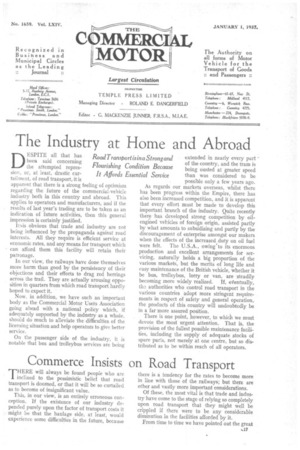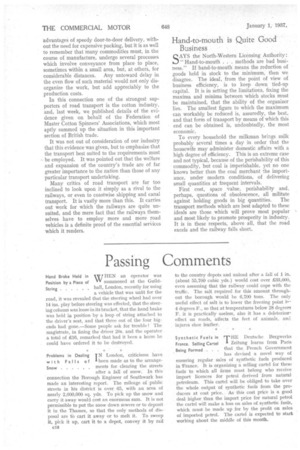Commerce Insists on Road Transport
Page 67

Page 68

If you've noticed an error in this article please click here to report it so we can fix it.
THERE will always be found people who are 1 inclined to the pessimistic belief that road transport is doomed, or that it will be so curtailed as to become of insignificant value.
This, in our view, is an entirely erroneous conception. If the existence of our industry depended purely upon the factor of transport costs it might be that the haulage side, at least, would experience some difficulties in, the future, because there is a tendency for the rates to become more in line with those of the railways; but there are other and vastly more important considerations.
Of these, the most vital is that trade and industry have come to the stage of relying so completely upon road transport that they might well be crippled if there were to be any considerable diminution in the facilities afforded by it.
From time to time we have pointed out the great 17 advantages of speedy door-to-door delivery, without the need, for expensive packing, but it is as well to remember that many commodities must, in the course of manufacture, undergo several processes which involve conveyance from place to place, sometimes within a small area, but, at others, for considerable distances. Any untoward delay in the even flow of such material would not only disorganize the work, but add appreciably to the production costs.
In this connection one of the strongest supporters of road transport is the cotton industry, and, last week, we published details of the evidence given on behalf of the Federation of Master Cotton Spinners' Associations, which most aptly summed up the situation in this important section of British trade.
It was not out of consideration of our industry that this evidence was given, but to emphasize that the transport best suited to the requirements must be employed. It was pointed out that the welfare and expansion of the country's trade are of far greater importance to the nation than those of any particular transport undertaking.
Many critics of road transport are far too inclined to look upon it simply as a rival to the railways, or even to coastwise shipping and canal transport. It is vastly more than this. It carries out work for which the railways are quite unsuited, and the mere fact that the railways themselves have to employ more and more road vehicles is a definite proof of the essential services which it renders.
Hand-to-mouth is Quite Good Business
SAYS the North-Western Licensing Authority : "Hand-to-mouth . . . methods are bad business." If hand-to-mouth means the reduction of goods held in stock to the minimum, then we disagree. The ideal, from the point of view of business efficiency, is to keep down tied-up capital. It is in setting the limitations, fixing the maxima and minima between which stocks must be maintained, that the ability of the organizer lies. The smallest figure to which the maximum can workably be reduced is, assuredly, the best, and that form of transport by means of which this end can be obtained is, undoubtedly, the most economic.
To every household the milkman brings milk probably several times a day in order that the housewife may administer domestic affairs with a high degree of efficiency. This is an extreme case and not typical, because of the perishability of this commodity, but coal is imperishable, yet no one knows better than the coal merchant the importance, under modern conditions, of delivering small quantities at frequent intervals.
First cost, space value, perishability and, perhaps, questions of obsolescence, all militate against holding goods in big quantities. The transport methods which are best adapted to these ideals are those which will prove most popular and most likely to promote prosperity in industry. It is in these respects, above all, that the road excels and the railway falls short.




























































































































































